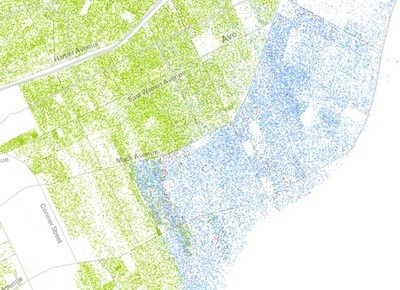
Unmasking Racial Capitalism’s Public Face
Can public things meaningfully protect us from capitalism’s bottom line? If not, is our hope in them as a lever of progressive politics misplaced?

Can public things meaningfully protect us from capitalism’s bottom line? If not, is our hope in them as a lever of progressive politics misplaced?

The Fair Housing Act, as written, provides several tools to challenge inequitable urban development. Yet the courts have been reluctant to enforce the law.

Elite white capital created housing for middle-class whites built by working-class whites. Nowhere in this process, nor in the profit of lending, the employment of housing construction, or the long-term appreciation of white homeownership, was there a meaningful place for African Americans to bridge racial economic inequality.

Every year, governments and public entities wrestle with tough decisions about how they will fund their communities, and every year we absolve Wall Street of its role in siphoning money away from our public budgets. Enough is enough.

Dependence on public debt is a hallmark of democratic capitalist governance. How, then, can we ensure that the interests of private investors do not overtake the needs of the people that debt is meant to serve?

American cities’ reliance on municipal debt must be understood as part of a larger structural reliance on concentrated, mobile capital.

Municipal bond finance is an important technology, but is it more like a hammer or an automobile?

By documenting how public debt produced our present nightmare, Destin Jenkins allows us to dream about using public money to mend the ills of our era.

Los Angeles’s King-Drew Medical Center, a public hospital originally intended to provide Black residents with quality healthcare, is a cautionary tale about using bond financing to advance racial equality.

To understand courts’ relation to the reproduction of economic domination requires close investigation of how they actually work for different types of litigants.

In my new article, Monopolizing Whiteness, I examine the causes and consequences of “white island districts,” i.e. those that enroll predominantly white and affluent student bodies, despite being in racially and economically diverse metropolitan areas. I theorize that white student segregation in districts like GPSD is a product of (what sociologists refer to as) social closure— a process of subordination whereby an in-group works to curtail an out-group from accessing resources constructed as scarce. I suggest that the “essential facilities” framework of antitrust law can help to illustrate what a legal framework looks like that could appropriately recognize and address the process and harms of social closure.

Understanding the law’s role in the project of Israeli colonization requires examining how distinct legal frameworks applied across a legally fragmented space can nevertheless share a common defining logic. One manifestation of this shared logic becomes evident by scrutinizing claims to land adjudicated by Israeli courts: Israeli state agencies and Jewish settler groups are treated as presumptively proper claimants of property while non-Jewish Palestinians are treated, at best, as dwellers who are not entitled to claim property but merely inhabit the land at the sufferance of Israeli authorities.

How can we fight for accountability when privatization is designed to allow the government and private contractors to evade just that? A recent lawsuit—and the campaign behind it—points to one underexplored answer.

In liberal-leftist discourses, both Zionist and otherwise, the pivotal year for what is called the Israeli-Palestinian conflict is 1967. Israel’s control over all aspects of Palestinians’ lives, both those who live within the ‘Jewish state’ and those who reside in the Occupied Territories, renders the 1967 paradigm not only unpersuasive, but ridiculous.

Much attention has been rightly paid to the billions of dollars that the U.S. government hands over to Israel every year, regardless of Israel’s war crimes, or even the warnings of military and diplomatic experts’ that such support might harm U.S. strategic interests in the region. Less public scrutiny has been trained on the U.S. government’s indirect support to the Israeli settlement enterprise through the export of private actors, ideology and capital. But the colonization of Palestine has always been a multinational endeavor that extends beyond state-based support and that is inextricably intertwined with private forms of action.